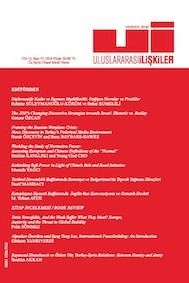
Uluslararası İlişkiler Dergisi
Yazarlar: Çağrı ERHAN
Konular:-
Anahtar Kelimeler:US,Central Asia,Russia,September 11,Geopolitics
Özet: As it had been the case during the Cold War, Central Asian region was not one of the priorities in the US foreign policy in the wake of the dissolution of the Soviet Union. However, this began to change in the second half of the 1990s as the US became aware of its vital interests in the region. This led to a situation in which the place accorded to Central Asia in the American national security strategies began to increase. Following September 11 attacks the US started cooperating with the Central Asian republics closely. US troops began to enter the region under the rhetoric of 'fight against terrorism" since the end of 2001. Thus, US administration began its military opening toward the region as it had been seeking ways to gain influence in the region since the second half of the 1990s. Washington realized its aim quickly due to the "temporary approval" of Russia and willingness of the regional countries to cooperate.
Dergi editörleri editör girişini kullanarak sisteme giriş yapabilirler. Editör girişi için tıklayınız.